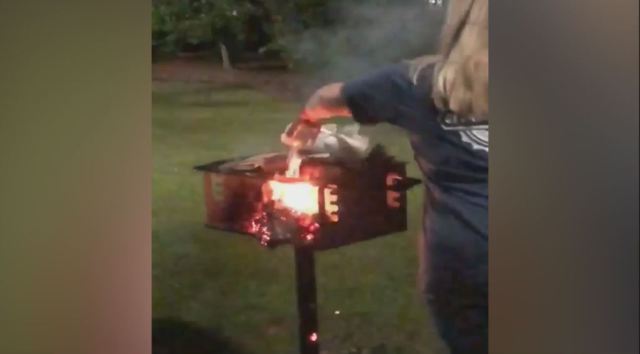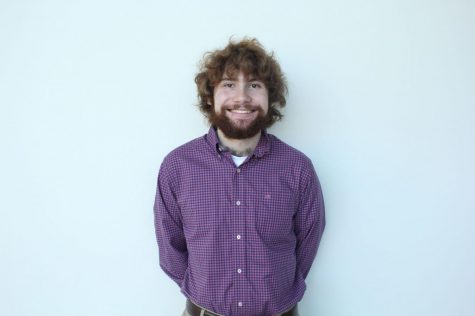A look back at last year’s infamous book burning
How far have we come?
October 9, 2020
On October 9, 2019, a group of Georgia Southern University students burned a copy of author Jennine Capó Crucet’s book “Make Your Home Among Strangers,” which was required reading for freshmen, in retaliation to the author’s presentation and statements of “white privilege” earlier.
While the event made nationwide headlines, several departments of the university and a large portion of the student body spoke out and protested this action, most demanding punishment for the book burning, the university itself made few moves besides condemning the act.
A year later, The George-Anne reached out to students on campus to ask them about how they believe the university had changed since that scandal–if any change was noticeable–as well as how their process in handling those scenarios had changed. To protect their privacy, The George-Anne replaced their names with pseudonyms.
“It’s kind of like [the university] just kind of brushed it aside a little, and then kind of went about their business,” Student A said.

“So I don’t really think it’s gotten better; I kinda think it’s like, ‘Okay, it happened, let it go.'”
“I’ve been here since 2014, and this is the same university; nothing’s changed,” said Student B.
“I don’t think they handled [the book burning] well, because all we got was a simple inclusion email, and I think things should have been done more than an email,” Student C stated. “And as far as recent events that happened over the summer with racial things, all we got was an email–I’m sick of getting emails, so I don’t think it was handled very well besides–all they gave us was an informational session on ‘what is book burning?’ I don’t think that’s enough.”
Some students expressed uncertainty about the current situation, however, and if there was enough evidence to determine a noticeable change in the university’s method of dealing with crises like the book burning.
“I don’t think we were able to see much of an improvement, just because [COVID-19] happened, so it was kind of a distraction. I don’t think they [the university] handled it the best; it could have been better,” said Student D. “I don’t think people really think about it right now, so it’s like we don’t really see much of an improvement right now. All I can say is that it could have been handled better.”
“Hopefully the university system will do better in terms of racism and racist acts, there just hasn’t been enough of that recently to tell if it has been changed, but I know the university system–especially Georgia Southern–has not had the best record in terms of dealing with people who do those acts and say those things,” said Student E.
Among the students The George-Anne reached out to, a few made known their hopes and suggestions for how the university could improve their processes to ensure another situation like the one a year ago won’t happen again.
“How [the university] respond is probably the most important,” Student F said. “In that case, if they respond differently, that could stop a lot of the backlash they receive; even if they don’t handle the situation, it’s still about the way they respond.”
“I feel like something about racism should be included in when students are applying to Georgia Southern; like they make you do the alcohol thing and all that stuff. I feel like something about race and diversity and inclusion should be included.” Student G said.
“I just want to be ensured that it’s equal on both sides, really, because, I can’t say, like it’s just speculation, but it’s hard for me to believe that if black students did the same thing that it wouldn’t have been perceived differently,” said Student H. “So I want to see that there’s equality all the way around, or I really just want those students–especially those students that are like publicly racist or have been outed as racist–to face consequences, because at the end of the day I understand inclusion, diversity, but if we’re going to promote that, then we need to make sure that all of those diverse populations feel safe.”
The George-Anne also reached out to the chairs of the departments of history and writing and linguistics, the first departments of the university to speak out against the book burnings.
“The department’s contributions align with the university’s focus on Inclusive Excellence, including welcoming Dr. TaJuan Wilson as the university’s first vice president for Inclusive Excellence,” said Carol Herringer, Ph.D., chair of the history department. “The steps that the university has taken to promote inclusivity are heartening. Unfortunately, I can’t comment on the campus climate, since we have not had a typical campus experience since before spring break.”
Herringer added she is hopefully to soon resume in-person gatherings including classes and hosting speakers.
“I think Georgia Southern University has taken several positive steps toward improving campus climate around issues of inclusion and diversity,” said Russell Willerton, Ph.D., chair of the writing and linguistics department. “It’s up to us as members of the Georgia Southern community to live our values and treat each other with utmost respect. I hope the campus community will follow the administration’s lead.”
Willerton also added that the hiring of Wilson sends a great message and is appreciative of his work thus far.
“We think Georgia Southern has made great strides in creating an environment of understanding, inclusivity and appreciation for our differences,” said Jennifer Wise, director of communications at GS. “It’s clear we have more to do — this is a process that will not end… While we are obviously still unable to control the actions of any one individual, we recognize that our success as an institution of higher learning depends on our ability to embrace, value, and appreciate the diversity of students, staff, faculty, administrators, and alumni across our campuses.”
The university also included this list of accomplishments from the last year in relation to Inclusive Excellence.
- Hired Dr. TaJuan R. Wilson, the university’s first Chief Diversity Officer (and Associate Vice President of Inclusive Excellence)
- Developed a comprehensive Inclusive Excellence Action Plan that’s tied to the university’s strategic plan and has measurable steps to gauge our success.
- The plan also charged colleges and individual units across campus to develop their own Inclusive Excellence action plans as part of this overall initiative.
- Revamped and expanded the Presidents’ Diversity Advisory Council and the Student Diversity Advisory Council.
- Drafted a Campus Climate Survey, which should be distributed later this year.
- Held honest and open listening sessions for faculty, staff, students and alumni to help university leadership better understand the landscape today.
- Recruited Inclusive Excellence Faculty and Staff Fellows, who will work with Dr. Wilson to develop and implement inclusive excellence initiatives.
- Drafted a joint Student Government Association/Faculty Senate resolution designed to increase the diversity of our faculty and staff.
- Created and implemented five new inclusive excellence modules into the First Year Experience course curriculum.
- Added language addressing the need for Inclusive excellence as a standard part of job descriptions
- Included diversity and inclusion components into every vice president’s annual scorecard.
- Hosted, and continue to host, a wide arrange of events and workshops to promote understanding and tolerance.
Editor’s Note: To view all of The George-Anne’s original coverage from last year, click on the articles below:
-
Students burn author’s book outside of Eagle Village | October 10
-
Writing and linguistics department makes statement on FYE book | October 10
-
The student behind viral tweet of burning book at Georgia Southern | October 11
-
SGA president responds to FYE guest incident | October 11
-
Crucet says in statement that a group gathered outside her hotel | October 11
-
President Marrero addresses book burning in email | October 11
-
SGA to host an open forum surrounding book burning incident | October 12
-
Lodging where Crucet stayed says no protest occurred | October 12
-
Georgia Southern history department to continue conversation on book burning with seminar | October 12
-
Writing and linguistics department releases updated statement | October 13
-
President Marrero responds to book-burning incident in Armstrong open forum | October 15
-
What Crucet said | October 17










